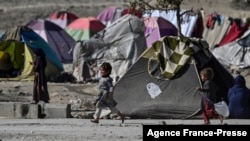A global aid agency said Tuesday that Afghanistan's Taliban authorities had evicted 280 internally displaced families, or about 1,700 people, from a makeshift settlement in Kabul and demolished it in breach of international obligations.
The Norwegian Refugee Council reported the evictions, saying victim families told its field staff they had to evacuate under "traumatic conditions." They reported the deaths of two children, one aged 4 and another aged 15, during the evacuation in the Pul-e-Shina area outside of the Afghan capital.
The NRC statement noted that families were waiting in the street, and humanitarian agencies were blocked from the site. The agency did not immediately know the cause of the reported deaths.
A spokesman for Kabul municipality, Niamatullah Barakzai, denied there were casualties during the clearance operation or that houses were demolished, saying the area was under illegal occupation.
"By expelling extremely vulnerable families, the Kabul authorities have added a new chapter to the long book of the suffering of displaced families in Afghanistan," said Neil Turner, NRC's county director in Afghanistan.
Turner urged Taliban authorities to halt further evictions and uphold their obligations under international humanitarian and human rights law.
The hardline group waged a deadly insurgency and returned to power in August 2021 as the United States-led NATO troops departed the country after 20 years of involvement in the Afghan war.
Millions displaced
Years of conflict, natural calamities, and economic hardships have displaced millions internally in impoverished Afghanistan.
The NRC noted that after seizing power, the Taliban had informed the humanitarian community of their plans to return internally displaced families to areas of origin and close makeshift settlements across the country.
The aid group warned that if realized, the policy would affect about 2 million individuals living in shantytown homes, usually in appalling conditions, and often highly dependent on humanitarian assistance to survive.
"Internally displaced people who are living in these settlements are already on the brink of survival and struggling with the economic crisis — this raises serious concerns that evictions will exacerbate the already extreme humanitarian needs," Turner said.
Many evicted families homeless
The NRC said that several thousand internally displaced people have already been forced from their homes despite repeated calls for the Taliban to engage with humanitarian agencies "to adopt a slower and more sustainable returns process." It added that many evicted families over the last year remained homeless and cut off from humanitarian assistance.
The international community has not yet recognized the Taliban administration as the legitimate authority for lacking political inclusivity and for restricting Afghan women's access to work and education.
The fundamentalist Taliban reject the criticism as interference in the internal affairs of Afghanistan, saying they govern the country according to local culture and Islamic law, or Sharia.




